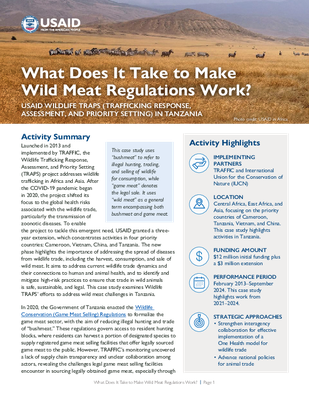What Does It Take to Make Wild Meat Regulations Work? USAID Wildlife TRAPS in Tanzania

The Wildlife Trafficking Response, Assessment, and Priority Setting (TRAPS) activity focuses on tackling wildlife trafficking in Africa and Asia. This case study highlights Wildlife TRAPS' initiatives in Tanzania, where efforts are aimed at enhancing supply chain management and traceability, improving wild meat regulation and laws, and conducting social behavior change campaigns. The goal is to mitigate the threats posed by zoonotic diseases and curb the unsustainable demand for wild meat.
In 2022, USAID collected this case study, as part of a series that looks at USAID-funding activities from around the world. The case study provides a snapshot of the activity and how it addresses the questions posed in the Wild Meat Learning Agenda. The case study provides a snapshot of the activity. For more information on how the Wildlife TRAPS activity has progressed in Tanzania see the following resources:
- Wildlife TRAPS Website
- Wildlife TRAPS Project 2 pager
- Webinar: Tanzania's Trade in Wild Meat: Reducing Risks and Managing Demand
- Webinar: Wild Meat and One Health
- From Bush to Butchery: The Game Meat Value Chain in Northern Tanzania
- Review: Options for Managing and Tracing Wild Animal Trade Chains to Reduce Zoonotic Risk
More information and resources about USAID’s approaches to addressing unsustainable wild meat demand are available at USAID’s Wild Meat Collaborative Learning Group. The information provided in the case study series does not necessarily represent the views or positions of USAID or the U.S. Government.

